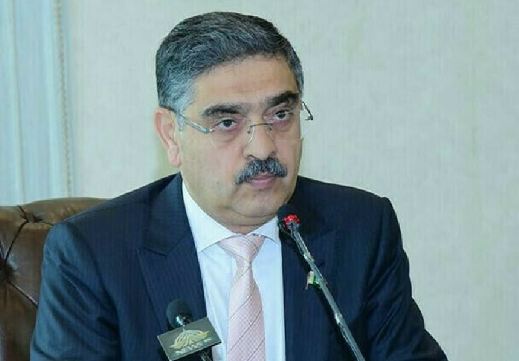NEW YORK, SEP 17 (DNA) — Caretaker Prime Minister Anwaarul Haq will join nearly 150 world leaders in next week’s UN General Assembly to deliberate about key international peace and security issues as well as Global South’s concerns over growing poverty, inflation and debt burden.
With the high-level segment of the 193-member Assembly’s 78th session beginning September 19, hundreds of New York Police Department (NYPD) personnel on Sunday began erecting roadblocks and check points around the UN Headquarters in Manhattan to turn the area into a high security zone to protect the visiting world leaders.
PM Kakar is scheduled to arrive in New York Monday as the head of the Pakistan delegation to the UNGA. He will address the Assembly on Sept 22, the first Pakistani caretaker premier to do so.
In his address, the prime minister will outline Pakistan’s perspective on a range of regional and general issues of concern, including the Jammu and Kashmir dispute. He will also elaborate on the significant measures taken by his caretaker administration to consolidate the country’s economic recovery and efforts to mobilise domestic and external investment.
In addition, the interim prime minister will hold bilateral meetings with counterparts from various countries as well as with the heads of international organisations, philanthropic organisations and corporate leaders. He also has a number of media engagements.
US President Joe Biden, as leader of the host country, will be the second speaker on Tuesday, the opening day of the annual gathering of world leaders who take the pulse of the planet and tackle global challenge.
The list of speakers indicates the presence of 145 heads of state and government, six vice-presidents, 4 deputy prime ministers and 38 ministers or chiefs of delegations — a total of 196.
This year’s theme is “Restoring Trust and Reigniting Global Solidarity”, but the credibility of the UN is currently being undermined by geopolitical conflicts, divisions and paralysis at the Security Council, as economic, humanitarian and climate-related crises continue. In an interview, Pakistan’s UN Ambassador, Munir Akram, underscored the need for a plan to counter the grim challenges facing the world.
“The 78th session of the General Assembly is meeting in a complex international environment, marked by conflicts, especially in Europe and Africa, growing great power tensions in Asia, a slowing global economy, 60 developing countries in financial distress, and as yet no clear strategy on how to address these challenges,” Ambassador Akram said.
Russia’s war in Ukraine, well into its second year, will again be a focus of the debate with Ukrainian President Volodymyr Zelenskiy attending in person for the first time since the conflict started. The war is exacerbating food price inflation in emerging markets and developing economies and adversely impacts some of the poorest and most vulnerable countries.
Several top-level meetings happening during the General Assembly focus on priorities of developing countries in Africa, Latin America and Asia: climate, health, financing for development, and how to get the Sustainable Development Goals – a global “to do” list created in 2015 – on track.
In a series of briefings, UN officials have said that efforts to address Global South needs, including tackling poverty and diseases and improving access to clean water and energy, are trailing far behind the target that UN member countries have set for themselves through the SDGs.
Briefing Pakistani media, Ambassador Akram, who has served twice as chairman of the Group of 77 (developing countries) plus China, said that Pakistan stands for the immediate expansion of concessional financing by the Multilateral Development Banks (MDBs), reduction of borrowing cost for developing countries, and allocation of $500 billion new Special Drawing Rights (SDRs).
With 134 members, G77 is the United Nations’ biggest intergovernmental group of emerging countries.
Ambassador Akram also stressed the need for urgent mobilisation of at least $1 trillion annually for investment in sustainable infrastructure (inter-alia energy, transport, housing, industry, agriculture, trade facilitation) for developing countries to boost the achievement of the SDGs in the remaining decade of action; fulfillment by the developed countries of their pledge of $100 billion annually towards climate finance and to at least double climate finance towards adaptation, and give developing countries due share in all economic decision-making bodies.
“The UN’s annual General Debate provides world leaders with a bully pulpit to speak out on the world’s most pressing human rights issues,” said Louis Charbonneau, UN director at Human Rights Watch, a prominent international watchdog body.
“They should all make use of this golden opportunity to generate discussion on world crises, finding justice for ongoing abuses, or bringing attention to issues outside the headlines.”
UN Secretary-General Antonio Guterres has urged states to focus greater attention on issues that are priorities for developing countries, including climate change and meeting the UN’s Sustainable Development Goals aimed at eradicating poverty. Meeting the Sustainable Development Goals is crucial to the rights to health, water, sanitation, food, and education, among other in the course of the 78th session.
“Action is what the world needs” the UN chief said at his bi-annual press conference on Wednesday, defining the gathering of world leaders as a “one of a kind moment” to both assess the state of world affairs but also “act for the common good.”
“This is not a time for indifference or indecision”, Guterres told reporters at UN Headquarters. “This is a time to come together for real, practical solutions.” “It is time for compromise for a better tomorrow. Politics is compromise. Diplomacy is compromise. Effective leadership is compromise.”
In the course of the 78th session, Pakistan will also table its traditional resolution affirming the right of self-determination and also one denouncing Islamophobia and desecration of the Holy Quran and Islamic symbols, besides its disarmament-related resolutions. — DNA

















